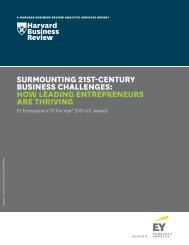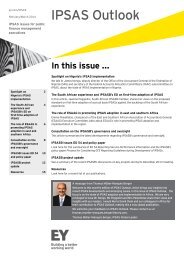You also want an ePaper? Increase the reach of your titles
YUMPU automatically turns print PDFs into web optimized ePapers that Google loves.
Africa 2030: Points of viewAfrica in 2015 and beyond could be peaceful, prosperity-achievedby ‘mature’ investment.Rob OttyRob Otty is the Managing Director of the South African practice of Norton, Rose Fulbright, a globallegal firm with more than 3,800 lawyers based in over 50 cities around the world.Although Africa continues to experience the rapid evolution ithas seen over the last few decades, the scramble by investors forthe continent that was a characteristic of the 1990s through themillennium and into the 2000s has evolved into a more matureinvestment approach.The level of investment may not have slowed, but the sense ofalmost panicked rush has been replaced by an acceptance that theopportunities the continent offers are not going anywhere.Investors now understand that Africa is a ‘long-term play’ ratherthan one that requires urgent and, unfortunately, occasionallyirrational exploitation. That investors have become wiser is notsurprising, since the continent today is not what it was 15 or even20 years ago. Whilst possibly a generalisation, the inexorableimprovement in governance and government policy, reducedlevels of crime and corruption and the burgeoning middle class,combined with an ease of access to markets, have all played rolesin separating myth from reality, allowing investors to treat Africanmarkets much as they would any other.As was to be expected, the unfolding Africa story is one that hasbeen watched closely by Afro-optimists and Afro-pessimists alike.Human nature being what it is, many predicted that the early boomof 2010-2020 would be short-lived. Pointing to examples of theso-called failed Africa state, pessimists were quick to paint Africa asviolent, corrupt and made up of “banana republics”. These gloomypredictions were not entirely devoid of merit. Parts of the continentcontinue to be challenged by dictatorship, corruption and violence.Civil war, terrorism and ethnic violence still remain far too prevalentas we approach the mid-point of the 21st century.Of course, these are not challenges unique to Africa. Thereinlies the problem. The pessimist prism continues to see Africaas a single entity. “Africa” is a term that continues to be appliedto African states indistinguishably and each is damned by thechallenges of the others.The reality is, of course, very different. Fortunately government,corporate and private investors alike have recognised that Africais not a country. It is a continent - a continent that is home to 55countries all of which have their own challenges, develop at theirown speed and, importantly, have their own successes. Thesesuccesses have, over the last 10-15 years become increasinglyapparent.Africa, the continent that was, for so long, the unknown entity, theepitome to some of Conrad’s “Heart of Darkness” is delivering on itspromise and taking its place in the sun.In the last decade African countries have seen an infrastructuralrevolution. Driven by the need to access and transport resources,many countries have seen the proliferation of railway lines, roadsand airports. Ports continue to be upgraded and constructed onboth the east and west coasts and oil and gas pipelines stretchacross borders, cutting from the coast deep into the interior.Trade corridors in the east and west complement those in the south.Cross-border regional commercial activity has picked up as a result -made easier by common regional customs duties, visa requirementsand a general ease of movement of both people and goods. Whilstthe ‘African Free Trade Zone’, first mooted in 2008, has never madeit past the “talk-shop” stage, members of the various regional tradeblocs like the East African Community (EAC), Southern AfricanDevelopment Community (SADC) and Economic Community ofWest Africa States (ECOWAS) have demonstrated a commitment todeveloping their regions to mutual benefit.Driving cooperation at regional level was the stark realisation in thelatter part of the initial boom period that each country member wassimply not able to develop sufficiently quickly enough on its own.Each needed the combined strength of the others to meet the hugeinfrastructure deficits, the massive power shortage and the growingconsumer base that was developing economies that needed andwanted to expand beyond their traditional borders.The expansion of African corporates across the continent andglobally is one of the success stories analysts have written muchabout. It began with South African companies first expanding intotraditional western markets. Whilst a handful had investments inparts of Africa for generations, it was only in 2010 that the realdrive by SA corporates into other African countries started, atrend that has not slowed down to date. Few are the medium tolarge South African corporates that do not have investments inneighbouring territories or further afield. This is a trend that is notlimited to South Africa.60





